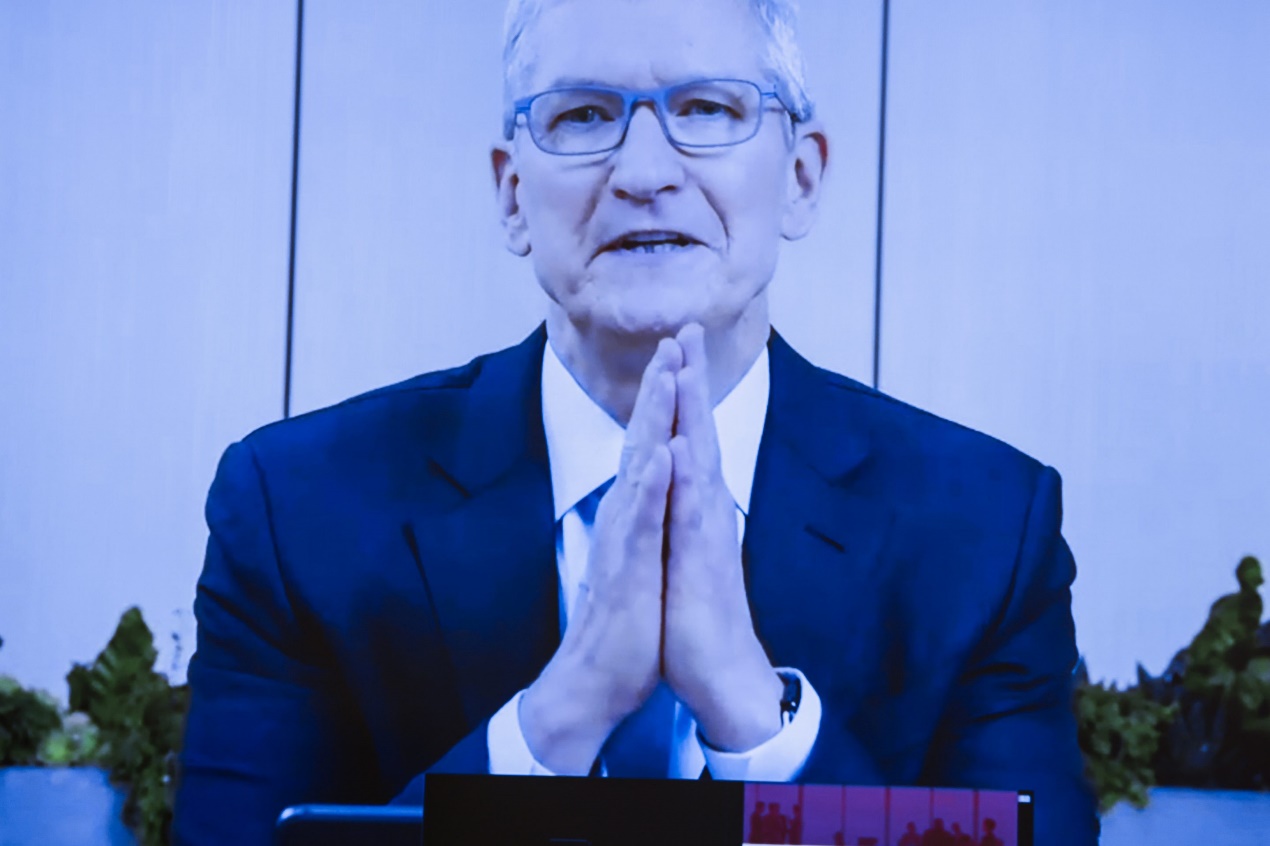
由于遭到員工的強(qiáng)烈抵制并使得離職潮頻發(fā),,谷歌(Google)最近取消了讓所有員工都恢復(fù)線下坐班的計劃,并允許很多員工繼續(xù)遠(yuǎn)程工作,。而蘋果(Apple)近期強(qiáng)制要求員工線下坐班的計劃已經(jīng)導(dǎo)致多人離職,,并在該公司內(nèi)部激起了強(qiáng)烈反對。
為什么這么多大公司的領(lǐng)導(dǎo)一定要員工返回辦公室坐班,?自2021年早春開始,,一系列廣泛而深入的調(diào)查研究了數(shù)千名員工對新冠肺炎疫情之后恢復(fù)線下坐班的偏好——它們的結(jié)果值得關(guān)注。
所有的調(diào)查結(jié)果都顯示,,超過四分之三的受訪者都強(qiáng)烈希望在后疫情時代繼續(xù)居家辦公——至少有一半的時間能夠居家辦公,。四分之一到三分之一的受訪者希望可以永久、全線遠(yuǎn)程工作,。40%到55%的受訪者表示,,如果不能保證一周至少有一半的時間可以完全線上工作,他們就會辭職,;還有許多人表示,,如果不能完全遠(yuǎn)程工作,他們也會辭職,。少數(shù)族裔員工對遠(yuǎn)程辦公表現(xiàn)出了尤其強(qiáng)烈的偏好,,以規(guī)避辦公室內(nèi)的歧視。
然而,,許多雇主卻打算強(qiáng)制要求員工在一周中的大部分時間回到辦公室,,或者完全恢復(fù)線下坐班,而這些員工本來可以輕松地在家遠(yuǎn)程工作,。
領(lǐng)導(dǎo)常說,“人”是他們最重要的資源,。然而,,不允許遠(yuǎn)程辦公的領(lǐng)導(dǎo)并沒有遵循這一原則。相反,他們只顧讓自己舒服,,即便這會破壞員工的士氣,、敬業(yè)程度和生產(chǎn)力;嚴(yán)重削弱留職率和新入職率,;并損害多樣性和包容性,。而他們的行為最終會成為企業(yè)命脈的嚴(yán)重威脅。
就這一問題,,我采訪了12家公司的61位中高層領(lǐng)導(dǎo),,我曾經(jīng)協(xié)助他們制定讓員工恢復(fù)線下坐班的戰(zhàn)略,并開始理解為什么一個看起來顯而易見的最優(yōu)選——給大部分人提供“線上+線下”的混合模式,,再滿足那些想要完全線上辦公,、并能夠保持高效率和高生產(chǎn)力的員工意愿——卻會被領(lǐng)導(dǎo)們拒絕。
這是因為領(lǐng)導(dǎo)們存在一系列的認(rèn)知偏見——會導(dǎo)致錯誤的戰(zhàn)略和財務(wù)決策的心理盲點(diǎn),。幸運(yùn)的是,,通過了解這些認(rèn)知偏差,并基于研究結(jié)果,、按部就班地采取措施解決它們,,我們就可以做出最佳決策。
很多人都渴望回到疫情爆發(fā)之前的世界,。他們陷入了一種“現(xiàn)狀偏見”,,渴望維持或回到他們所認(rèn)為的合適的境況與行事方式。
領(lǐng)導(dǎo)們希望每個人都回到辦公室的一個主要原因是,,他們會對在家工作的人感到不爽,。他們自己的職業(yè)生涯就是在被其他員工包圍的環(huán)境中度過的。他們希望恢復(fù)定期坐班,,讓員工能夠被周圍同事的工作能量感染,。
他們落入的是一種“錨定偏見”。這種心理盲點(diǎn)會讓我們感到自己被最初的經(jīng)驗和信息束縛,。
絕大多數(shù)員工在居家辦公時也表現(xiàn)良好,,這一證據(jù)并沒有使領(lǐng)導(dǎo)們的觀點(diǎn)有多大改觀——“確認(rèn)偏誤”可以很好地解釋這種看似不合理的現(xiàn)象。我們的大腦擅長忽略與我們堅信的東西相矛盾的信息,,而只會尋求那些強(qiáng)化我們既定信念的信息,。
不太配合調(diào)查的領(lǐng)導(dǎo)者通常告訴我,他們“不用接受調(diào)查”,,因為他們很自信地覺得,,大多數(shù)員工會寧愿在辦公室而不是在家工作,而對于大規(guī)模公共調(diào)查顯示出的相反事實,,他們也不屑一顧,。例如,蘋果員工的一大怨言就是該公司從未進(jìn)行過有效的調(diào)查并聽取員工的意見。
這種拒絕調(diào)查的態(tài)度不僅體現(xiàn)了“確認(rèn)偏誤”,,其中還夾雜了另一種認(rèn)知偏差——“錯誤共識效應(yīng)”,。這種心理盲點(diǎn)會讓我們高估,團(tuán)隊中的其他人(例如公司員工)和我們所見略同,,而實際情況并非如此,。
一些不愿意實行遠(yuǎn)程辦公的領(lǐng)導(dǎo)提出了其中的問題,包括員工會倦怠,、甚而會惡化辦公文化,。但對每個問題的進(jìn)一步調(diào)查都顯示,領(lǐng)導(dǎo)從未提出過能夠解決好這些居家辦公問題的戰(zhàn)略,。
2020 年 3 月,,美國出臺封禁措施,人們猝不及防地轉(zhuǎn)向線上辦公也是其中的一部分要求,。大家都將這種轉(zhuǎn)變視為非常短暫的緊急情況,,自然而然、合情合理地專注于完成組織交給的必要任務(wù),。但他們忽視了真正將公司凝聚在一起,、激勵員工并防止倦怠的,是社會性和情感性的粘合劑,。
這反映了一種被稱為“功能固著”的認(rèn)知偏差,。當(dāng)我們對一個系統(tǒng)應(yīng)該如何運(yùn)轉(zhuǎn)已經(jīng)有一定的認(rèn)識時,就會忽略其他可能的功能,、用途和行為,。即使當(dāng)情況發(fā)生了變化,這些新的功能,、用途和行為更適合新形勢,,并可以更好地解決問題,我們還是會傾向于認(rèn)定那些先前的功用,。
疫情之后,,人們將需要重塑對職場中雇主-雇員關(guān)系的期望。領(lǐng)導(dǎo)們要用有科學(xué)研究依據(jù)的策略,,避免一些會讓他們陷入認(rèn)知偏差的下意識反應(yīng),。只有這樣,他們才能夠最大限度地留住老員工,,招到新員工,,提振士氣、生產(chǎn)力和職場文化——從而最大限度地守住企業(yè)的命脈,。(財富中文網(wǎng))
本文作者格萊布?齊普爾斯基(Gleb Tsipursky)是一位行為科學(xué)家,、也是咨詢公司Disaster Avoidance Experts的首席執(zhí)行官,,著有《重返辦公室與混合/遠(yuǎn)程辦公團(tuán)隊領(lǐng)導(dǎo)法:比較優(yōu)勢的最佳實踐標(biāo)準(zhǔn)手冊》(Returning to the Office and Leading Hybrid and Remote Teams: A Manual on Benchmarking to Best Practices for Competitive Advantage)。
編譯:陳聰聰
由于遭到員工的強(qiáng)烈抵制并使得離職潮頻發(fā),,谷歌(Google)最近取消了讓所有員工都恢復(fù)線下坐班的計劃,并允許很多員工繼續(xù)遠(yuǎn)程工作,。而蘋果(Apple)近期強(qiáng)制要求員工線下坐班的計劃已經(jīng)導(dǎo)致多人離職,,并在該公司內(nèi)部激起了強(qiáng)烈反對。
為什么這么多大公司的領(lǐng)導(dǎo)一定要員工返回辦公室坐班,?自2021年早春開始,,一系列廣泛而深入的調(diào)查研究了數(shù)千名員工對新冠肺炎疫情之后恢復(fù)線下坐班的偏好——它們的結(jié)果值得關(guān)注。
所有的調(diào)查結(jié)果都顯示,,超過四分之三的受訪者都強(qiáng)烈希望在后疫情時代繼續(xù)居家辦公——至少有一半的時間能夠居家辦公,。四分之一到三分之一的受訪者希望可以永久、全線遠(yuǎn)程工作,。40%到55%的受訪者表示,,如果不能保證一周至少有一半的時間可以完全線上工作,他們就會辭職,;還有許多人表示,,如果不能完全遠(yuǎn)程工作,他們也會辭職,。少數(shù)族裔員工對遠(yuǎn)程辦公表現(xiàn)出了尤其強(qiáng)烈的偏好,,以規(guī)避辦公室內(nèi)的歧視。
然而,,許多雇主卻打算強(qiáng)制要求員工在一周中的大部分時間回到辦公室,,或者完全恢復(fù)線下坐班,而這些員工本來可以輕松地在家遠(yuǎn)程工作,。
領(lǐng)導(dǎo)常說,,“人”是他們最重要的資源。然而,,不允許遠(yuǎn)程辦公的領(lǐng)導(dǎo)并沒有遵循這一原則,。相反,他們只顧讓自己舒服,,即便這會破壞員工的士氣,、敬業(yè)程度和生產(chǎn)力;嚴(yán)重削弱留職率和新入職率,;并損害多樣性和包容性,。而他們的行為最終會成為企業(yè)命脈的嚴(yán)重威脅。
就這一問題,,我采訪了12家公司的61位中高層領(lǐng)導(dǎo),,我曾經(jīng)協(xié)助他們制定讓員工恢復(fù)線下坐班的戰(zhàn)略,,并開始理解為什么一個看起來顯而易見的最優(yōu)選——給大部分人提供“線上+線下”的混合模式,再滿足那些想要完全線上辦公,、并能夠保持高效率和高生產(chǎn)力的員工意愿——卻會被領(lǐng)導(dǎo)們拒絕,。
這是因為領(lǐng)導(dǎo)們存在一系列的認(rèn)知偏見——會導(dǎo)致錯誤的戰(zhàn)略和財務(wù)決策的心理盲點(diǎn)。幸運(yùn)的是,,通過了解這些認(rèn)知偏差,,并基于研究結(jié)果、按部就班地采取措施解決它們,,我們就可以做出最佳決策,。
很多人都渴望回到疫情爆發(fā)之前的世界。他們陷入了一種“現(xiàn)狀偏見”,,渴望維持或回到他們所認(rèn)為的合適的境況與行事方式,。
領(lǐng)導(dǎo)們希望每個人都回到辦公室的一個主要原因是,他們會對在家工作的人感到不爽,。他們自己的職業(yè)生涯就是在被其他員工包圍的環(huán)境中度過的,。他們希望恢復(fù)定期坐班,讓員工能夠被周圍同事的工作能量感染,。
他們落入的是一種“錨定偏見”,。這種心理盲點(diǎn)會讓我們感到自己被最初的經(jīng)驗和信息束縛。
絕大多數(shù)員工在居家辦公時也表現(xiàn)良好,,這一證據(jù)并沒有使領(lǐng)導(dǎo)們的觀點(diǎn)有多大改觀——“確認(rèn)偏誤”可以很好地解釋這種看似不合理的現(xiàn)象,。我們的大腦擅長忽略與我們堅信的東西相矛盾的信息,而只會尋求那些強(qiáng)化我們既定信念的信息,。
不太配合調(diào)查的領(lǐng)導(dǎo)者通常告訴我,,他們“不用接受調(diào)查”,因為他們很自信地覺得,,大多數(shù)員工會寧愿在辦公室而不是在家工作,,而對于大規(guī)模公共調(diào)查顯示出的相反事實,他們也不屑一顧,。例如,,蘋果員工的一大怨言就是該公司從未進(jìn)行過有效的調(diào)查并聽取員工的意見。
這種拒絕調(diào)查的態(tài)度不僅體現(xiàn)了“確認(rèn)偏誤”,,其中還夾雜了另一種認(rèn)知偏差——“錯誤共識效應(yīng)”,。這種心理盲點(diǎn)會讓我們高估,團(tuán)隊中的其他人(例如公司員工)和我們所見略同,,而實際情況并非如此,。
一些不愿意實行遠(yuǎn)程辦公的領(lǐng)導(dǎo)提出了其中的問題,包括員工會倦怠,、甚而會惡化辦公文化,。但對每個問題的進(jìn)一步調(diào)查都顯示,,領(lǐng)導(dǎo)從未提出過能夠解決好這些居家辦公問題的戰(zhàn)略。
2020 年 3 月,,美國出臺封禁措施,,人們猝不及防地轉(zhuǎn)向線上辦公也是其中的一部分要求。大家都將這種轉(zhuǎn)變視為非常短暫的緊急情況,,自然而然,、合情合理地專注于完成組織交給的必要任務(wù)。但他們忽視了真正將公司凝聚在一起,、激勵員工并防止倦怠的,是社會性和情感性的粘合劑,。
這反映了一種被稱為“功能固著”的認(rèn)知偏差,。當(dāng)我們對一個系統(tǒng)應(yīng)該如何運(yùn)轉(zhuǎn)已經(jīng)有一定的認(rèn)識時,就會忽略其他可能的功能,、用途和行為,。即使當(dāng)情況發(fā)生了變化,這些新的功能,、用途和行為更適合新形勢,,并可以更好地解決問題,我們還是會傾向于認(rèn)定那些先前的功用,。
疫情之后,,人們將需要重塑對職場中雇主-雇員關(guān)系的期望。領(lǐng)導(dǎo)們要用有科學(xué)研究依據(jù)的策略,,避免一些會讓他們陷入認(rèn)知偏差的下意識反應(yīng),。只有這樣,他們才能夠最大限度地留住老員工,,招到新員工,,提振士氣、生產(chǎn)力和職場文化——從而最大限度地守住企業(yè)的命脈,。(財富中文網(wǎng))
本文作者格萊布?齊普爾斯基(Gleb Tsipursky)是一位行為科學(xué)家,、也是咨詢公司Disaster Avoidance Experts的首席執(zhí)行官,著有《重返辦公室與混合/遠(yuǎn)程辦公團(tuán)隊領(lǐng)導(dǎo)法:比較優(yōu)勢的最佳實踐標(biāo)準(zhǔn)手冊》(Returning to the Office and Leading Hybrid and Remote Teams: A Manual on Benchmarking to Best Practices for Competitive Advantage),。
編譯:陳聰聰
Because of strong employee resistance and turnover, Google recently backtracked from its plan to make all employees return to the office and allowed many to work remotely. Apple’s plan to force its staff back to the office has caused many to leave the company and led to substantial internal opposition.
Why are these and so many other leaders of major companies compelling employees to return to the office? They must know about the extensive, in-depth surveys from early spring 2021 that asked thousands of employees about their preferences on returning to the office after the pandemic.
All of the surveys revealed strong preferences for working from home post-pandemic at least half the time for over three-quarters of all respondents. A quarter to a third of all respondents desired full-time remote work permanently. Between 40% and 55% of respondents said they’d quit without permanent remote options for at least half the workweek; of these, many would leave if not permitted fully remote work. Minority employees expressed an especially strong preference for remote work to escape in-office discrimination.
Yet many employers intend to force their employees who can easily work remotely back to the office for much or all of the work week.
Leaders frequently proclaim that people are their most important resource. Yet the leaders resistant to permitting telework are not living by that principle. Instead, they’re doing what they feel comfortable with, even if it devastates employee morale, engagement, and productivity; seriously undercuts retention and recruitment; and harms diversity and inclusion. In the end, their behavior is a major threat to the bottom line.
Interviewing 61 mid-level and senior leaders on this question in 12 companies that I helped develop a strategic approach to transitioning back to the office, I came to understand why they’re resistant to the seemingly obvious best option: a hybrid model for most, with full-time permanent remote work for those who both want it and show high effectiveness and productivity.
This is because of cognitive biases, which are mental blind spots that lead to poor strategic and financial decision-making. Fortunately, by understanding these cognitive biases and taking research-based steps to address them, we can make the best decisions.
Many people feel a desire to go back to the world before the pandemic. They fall for status quo bias, a desire to maintain or get back to what they see as the appropriate situation and way of doing things.
A major factor in leaders wanting everyone to return to the office stems from their personal discomfort with work from home. They spent their career surrounded by other people. They want to resume regularly walking the floors, surrounded by the energy of staff working.
They’re falling for anchoring bias. This mental blind spot causes us to feel anchored to our initial experiences and information.
The evidence that work from home functions well for the vast majority doesn’t cause them to shift their perspective in any significant manner. Confirmation bias offers an important explanation for this seeming incongruity. Our minds are skilled at ignoring information that contradicts our beliefs, and looking only for information that confirms them.
Reluctant leaders usually tell me they don’t want to do surveys because they feel confident that the large majority of their employees would rather work at the office than at home. They wave aside the fact that large-scale public surveys show the opposite. For instance, one of the major complaints by Apple employees is the company’s failure to do effective surveys and listen to employees.
In this refusal to do surveys, confirmation bias is compounded by another cognitive bias called the false consensus effect. This mental blind spot leads us to envision other people in our in-group—such as those employed at our company—as being much more like ourselves in their beliefs than is the actual case.
Some of these resistant leaders brought up challenges related to working from home, ranging from burnout to deteriorating culture. But further inquiry on each problem reveals that the leaders never addressed these work-from-home problems strategically.
They transitioned to telework abruptly as part of the March 2020 lockdowns. Perceiving this shift as a very brief emergency, they focused, naturally and appropriately, on accomplishing the necessary tasks of the organization. They ignored the social and emotional glue that truly holds companies together, motivates employees, and protects against burnout.
That speaks to a cognitive bias called functional fixedness. When we have a certain perception of how systems should work, we ignore other possible functions, uses, and behaviors. We do this even if these new functions, uses, and behaviors offer a better fit for a changed situation and would address our problems better.
The post-pandemic office will require the realignment of employer-employee expectations. Leaders need to use research-based strategies to overcome their gut reactions that cause them to fall victim to mental oversights. Only by doing so can they maximize retention, recruitment, morale, productivity, and workplace culture—and thus their bottom line.
Gleb Tsipursky is a behavioral scientist, CEO of the future-proofing consultancy Disaster Avoidance Experts, and author of Returning to the Office and Leading Hybrid and Remote Teams: A Manual on Benchmarking to Best Practices for Competitive Advantage.






